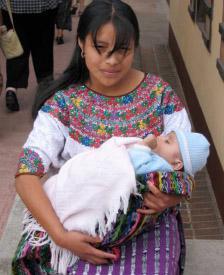
Image courtesy of Jody Lori.
This course introduces the student to global health concepts and the network of organizations working to advance health care internationally. Emphasis for this course is on the global burden of disease and determinates of health. It will provide the student with a broad introduction to programs, systems and policies affecting global health. Students will explore facets of the global health care delivery system, health care economics and the political process and its impact on the health of individuals and populations.
Instructor: Jody Lori
dScribes: Katherine Marshall, Matthew Simpson
Course Level: Undergraduate
Course Structure: 2-hour lecture, once a week
Syllabus
This course introduces the student to global health concepts and the network of organizations working to advance health care internationally. Emphasis for this course is on the global burden of disease and determinates of health. It will provide the student with a broad introduction to programs, systems and policies affecting global health. Students will explore facets of the global health care delivery system, health care economics and the political process and its impact on the health of individuals and populations.
Course Objectives
By completion of the course students will be able to:
Objective 1: Explain health and development within a global health context.
Objective 2: Demonstrate an understanding of global demographic and health determinants.
Objective 3: Identify global health challenges and issues.
Objective 4: Utilize the process of critical thinking to develop strategies for dealing with social and ethical dilemmas in delivering health care in low and middle resource settings.
Objective 5: Discuss the major communicable and non-communicable disease burdens impacting global health.
Objective 6: Discuss programmatic approaches to specific global health issues.
Teaching Methods
This course will be taught using multiple methods, including seminars, group work, case study analyses, videos, and web-based technologies.
Required Texts
Jacobsen, KH (2007). Introduction to Global Health, Jones and Bartlett: Sudbury, MA.
Course Readings
For each class session, you will be assigned a chapter of the textbook, several journal articles, and one or more videos. You are strongly encouraged to review for each class topic the USAID global health e-learning module for that topic http://www.globalhealthlearning.org Each week readings and activities are listed in the topical outline. The classes are completely interactive. You are expected to come to class having done the readings and assignments and be ready to help the class engage in the identification of key problems, who gets them, why, their social and economic consequences and what can be done in low cost and highly effective ways to address them. All students are expected to be active participants.
Web References
Demographic and Health Surveys www.measuredhs.com
Disease Control Priorities Project, 2nd Edition www.dcp2.org
Gapminder – resource for global health statistics and presentations http://www.gapminder.org
Global Health Council www.globalhealth.org
Global Health Education Consortium www.Globalhalthedu.org
Global Health Facts http://www.globalhealthfacts.org/
Global Health Supercourse www.pitt.edu/~super1/
Maps of the World www.embassyworld.com/maps
The Global Fund To Fight Against AIDS, TB, and Malaria www.theglobalfund.org/en/
The Kaiser Family Foundation-online health policy resource for faculty and students http://www.kaiseredu.org/
The Lancet www.thelancet.com
The Lancet Student http://www.thelancetstudent.com/category/global-health-resources/
The Population Reference Bureau www.prb.org
The World Bank www.worldbank.org
The World Health Organization www.who.int
UNAIDS www.unaids.org
UNICEF www.unicef.org
UNICEF – Statistics www.childinfo.org
United Nations Development Program www.undp.org
USAID www.usaid.gov
USAID 2007 Mini-University http://www.maqweb.org/miniu/sessions.php
USAID Global Health elearning www.globalhealthlearning.org
US Centers for Disease Control and Prevention www.cdc.gov
Guidelines for Bibliography and References:
Publication Manual of the American Psychological Association. 6th , 2010.
Course Requirements
Article Review: Each student will select an article on a global health topic and complete a critical review of the article. Attention to questions of the intersections and/or interrelatedness of gender and health, use of either a theoretical perspective (e.g. feminist theory, post-colonial feminist theory, neoliberalism, social justice or human rights perspective or consideration of the impact of globalization should be included in the critique. The critique must be no longer than 3 pages.
Millennium Development Goals Discussion: Each student group will lead the class in a facilitated discussion on one of the Millennium Development Goals (MDG). It is expected that the facilitation group will have spent additional time analyzing the readings and be prepared to both guide the discussion and answer questions. Each facilitation group will have approximately 50 minutes of class time. Facilitation may include writing discussion questions and/or planning small group activities. The discussion leaders will present background on the specific MDG, what has been done to date toward achieving the goal, including the impact of the advances in science, economics or policy that have contributed to the successes or failures.
Brief Papers: Each paper should be written as a policy brief from you, an intern with the State Department in a low-resource country to the Secretary of Health. As you write the brief, it will be helpful to put yourself into the role of the Secretary.
Each paper should be three pages long, double-spaced, in 12 point Times New Roman or Arial font with one-inch margins. It must not be longer than that or I will not read or grade it. The paper should have no typos and no grammatical errors. Each brief will be graded on the basis of:
Following the guidelines of the assignment
- Clarity
- Appropriate use of the evidence and data, both about your country and comparative
- Reasonableness of your conclusions
Each brief needs to be written in a manner that will allow the aide to the Minister of Health to brief him or her on it in about 3 minutes in a car on the way to some meeting, since that is what often really happens.
Each brief should be written about a country in a different region of the world. The papers should be written on low- or middle-income countries, since they are the focus of this course. This will allow you to use the papers to explore health and development issues in a variety of settings.
The briefing note should start with a single paragraph that summarizes for the minister all of the points you want to make. That summary paragraph would read something like:
“About xxx people die every year of TB in our country. The incidence of TB is YYY. About UUU people in our country get drug-resistant TB every year and about HHH% of those who are infected with HIV have active TB disease. TB affects largely the urban and rural poor and stems from poverty, general ill health, and the lack of coverage of our health services. TB causes illness for an extended period, stops people from working, causes them to spend large amounts on health, and leads many families into poverty. DOTs is a low-cost approach to TB diagnosis and treatment that we are not using sufficiently. We must immediately expand our DOTs program, starting in the north, where the disease burden is highest. We must also pay special attention to the diagnosis and management of drug-resistant TB and to TB/HIV co-infection. I expand on these comments below.”
Each paper must begin with this “one paragraph tells all summary.” The paper should answer the following questions:
What is the nature and magnitude of the problem?
- Who is affected by it?
- What are the risk factors for the problem?
- What are the economic and social consequences of the problem?
- What few priority steps do you recommend be taken to address the problem and what is your rationale for these recommendations?
Please also note, however, that in the “real world” you would also have to tell the minister how much your recommendations would cost and how she/he might pay for them. I am sparing everyone that need, since this is an introductory course.
Brief number 1 will summarize for a country of your choice the key issues in women’s or children’s health, who is most affected by them, key risk factors, the links between these issues with social and economic development and what might be done to enhance the health of women and children in the poorest countries in cost-effective ways.
Brief number 2 will summarize, for a country of your choice, the key nutrition issues faced by the country, who they most affect, key risk factors, their link with health and economic development, and what might be done to address them in cost-effective ways.
Submitting Papers and Assignments
You will submit each paper electronically through C-tools. Save each paper in the following format so I know who wrote them: “your last name_first initial_and paper 1, 2, or 3 or article review”. For example: Lori_J_brief1
Papers must be turned in at the latest at the end of the class on the date they are due. Except for pre-arranged tardiness, any paper that is late will be graded down by one full grade for each class (week) it is late.
Class Participation and Attendance
Class attendance and participation is strongly encouraged. As classes center on discussion, you will be at a serious disadvantage if you choose not to come to class
If electing 3 credits:
Your additional requirement from this course will be a third brief and a scholarly paper.
Brief number 3 will summarize for a country of your choice the burden of a particular communicable or non-communicable disease, the people most affected by this disease, key risk factors, the economic and social costs of this disease, and what might be done to address this disease in cost-effective ways.
Scholarly paper must be designed as follows:
You should define a health problem within the focus of this course. The scholarly paper should be a critical analysis of a health problem and innovative strategies found in the literature currently used to address with the problem. You should discuss such aspects as sustainability, local personnel to implement and potential use of technology. Discuss the sustainability of the strategy and how to assess its overall impact. Present the pros and cons based on your review of the literature on this topic. Paper should be limited to 10-12 pages (excluding references).
Paper Requirements:
Introduction – (15%) Clearly define your topic and state your thesis. Be sure to outline the population(s) affected. Prepare the reader for your analysis.
Literature Review – (30%) Present a thorough summary of recent academic literature on your topic area, including the policy focus you are addressing. Integrate related concepts and findings, and discuss connections or contrasting viewpoints. Present the information in a logical, concise and well-documented manner.
Discussion – (25%) Incorporate themes and issues discussed in the course, such as social justice and access to health care, health care as a human right, post colonial feminist theory, theories of development, feminist thought, gender socialization, and/or power differentials. Be sure to examine the research critically, and discuss possible assumptions of the researchers as they affect the research. What are the gaps in the literature, and why might there be those particular gaps?
Relevance – (15%) Explain the relevance of the topic and your analysis to global health. For example this could be done by placing the topic of your paper within the larger context of a social justice framework or women’s health issues. Is your analysis of the topic new? Does it challenge previous arguments or perspectives? How does your topic get addressed or not addressed by the current status of health policy. What are the risks of having global health policy that address this topic? Consider the implications of the global effects on the local realities.
Summary and Conclusion – (5%) Summarize the major points of your paper. This section may include recommendations for the future, but should not introduce new information.
Sources/Citations – (5%) You must use at least 10 recent (1998-present), academic, scholarly apbooks put out by academic publishers. All sources must be appropriately documented in the text using APA formats, and listed in a reference section at the end.
Presentation - (5%) Length is 10-12 pages of text, 12-point New Times Roman or Arial font, double-spaced, one-inch margins. Thoughts are expressed clearly and logically, arguments are well-organized, and paper is free of grammar and spelling errors.
Grading Rubric
Topic - Due Date - Students electing 2 credits (Your choice: 2 of the 3 paper topics to submit) - Students electing 3 credits
- MDG Discussion Lead - Per Topic - 25% - 25%
- Paper #1 - October 12th - 25% - 10%
- Paper #2 - Novemeber 9th - 25% - 10%
- Paper #3 - November 16th - 25% - 10%
- Article Review - December 7th - 25% - 20%
- Scholarly Paper - December 15th - N/A - 25%
Grading Scale
100–97 = A+
96–93 = A
92–90 = A-
89-87 = B+
86-83 = B
82-80 = B-
79-77 = C+
76-73 = C
72-70 = C-
Academic Integrity
Please review the School of Nursing’s policy on academic integrity located in Nursing Student Code of Academic Conduct.
Learning Objectives
By completion of the course students will be able to:
Objective 1: Explain health and development within a global health context.
Objective 2: Demonstrate an understanding of global demographic and health determinants.
Objective 3: Identify global health challenges and issues.
Objective 4: Utilize the process of critical thinking to develop strategies for dealing with social and ethical dilemmas in delivering health care in low and middle resource settings.
Objective 5: Discuss the major communicable and non-communicable disease burdens impacting global health.
Objective 6: Discuss programmatic approaches to specific global health issues.
Reading List
Required Texts
Jacobsen, KH (2007). Introduction to Global Health, Jones and Bartlett: Sudbury, MA.
Course Readings
For each class session, you will be assigned a chapter of the textbook, several journal articles, and one or more videos. You are strongly encouraged to review for each class topic the USAID global health e-learning module for that topic http://www.globalhealthlearning.org. Each week readings and activities are listed in the topical outline. The classes are completely interactive. You are expected to come to class having done the readings and assignments and be ready to help the class engage in the identification of key problems, who gets them, why, their social and economic consequences and what can be done in low cost and highly effective ways to address them. All students are expected to be active participants.
Schedule
Week #1: (9/7/10)
Topic: Overview of the course
Health and Human Rights: An Overview
Week #2: (9/14/10)
Topic: Health Inequities
Film: What Are We Doing Here?
Week #3: (9/21/10)
Topic: Millennium Development Goals and Burden of Disease
Week #4: (9/28/10)
Topic: Global health Challenges and Issues
Week #5: (10/5/10)
Topic: Maternal Health
MDG #5
Guest Speakers: Dr. Pamela Andreatta & Joey Perosky
Week #6: (10/12/10)
Topic: Culture and Health
MDG #1
Paper 1 due
Week #7: (10/19/10)
No Class.
Week #8 (10/26/10)
Topic: Child Health
MDG#4
Guest Speaker: Cathy Bartos RN
Week #9 (11/2/10)
Topic: Infectious Diseases – HIV
MDG#6
Guest Speaker: Dr. Jon Cohn (7pm)
Week #10 (11/9/10)
Nutrition
MDG#2
Guest Speaker: Dr. Betsy Lozoff
Paper 2 due
Week # 11 (11/16/10)
Wallenburg Medal Ceremony
Rackham Auditorium
Medal for Global Public Health
Dr. Mukwegu
Paper 3 due
Week #12 (11/23/10)
Environmental Health
MDG #7
Guest Speaker: Dr. Elisha Rennes
Week #13 (11/30/10)
Global Health Priorities
MDG#3
A Walk to Beautiful - film
Week #14 (12/7/10)
Human Resources for Health/Workforce Issues
MDG #8
Guest Speaker: Amy Starke, RN, FNP
Article Review due
Week #15
Scholarly paper due December 15, 2010 for those electing 3 credits
About the Creators

Jody Lori
Dr. Jody Lori is Clinical Assistant Professor at the U-M School of Nursing and Director for the Office of Global Outreach. Dr. Lori's work is based on a human right’s approach to reduce maternal mortality disparities globally. Working with this focus, her program of research centers on community-based interventions to address the high rates of maternal and neonatal mortality in sub-Saharan Africa. Currently, she is working in collaboration with the American College of Nurse-Midwives (ACNM) with funding from a private donor on a major multi-year project addressing midwifery pre-service education and faculty retention in Ghana and Cambodia. Her research in Ghana is focused on describing pathways for posting professional midwives to underserved and deprived rural areas to encourage rural service for the Ministry of Health. Past field work experience has included travel to Ghana, Guatemala, Ethiopia, Liberia, Mexico and Zambia. more...
- PhD, University of Arizona, Tucson, AZ, 2009
- MS, University of Michigan, Ann Arbor, MI, 1992
- BSN, University of Michigan, Ann Arbor, MI ,1980

Image courtesy of Jody Lori.
Jump to:
| Document Title | Creator | Downloads | License |
|---|---|---|---|
|
Syllabus |
Jody Lori
|
| Document Title | Creator | Downloads | License |
|---|---|---|---|
|
Topical Outline |
Jody Lori
|
| Document Title | Creator | Downloads | License |
|---|---|---|---|
|
Week 01: Human Rights and the Determinants of Health |
Jody Lori
|
||
|
Week 03(a): Millennium Development Goals - An Overview |
Jody Lori
|
||
|
Week 03(b): Global Burden of Disease |
Jody Lori
|
||
|
Week 04: Accessing the World - Global Health Information Resources: an Introductory Tour |
Gurpreet Rana
|
||
|
Week 06: Cultural Childbirth Practices, Beliefs & Traditions in Liberia |
Jody Lori
|
||
|
Week 08: Child Health |
Cathy Bartos
|
| Document Title | Creator | Downloads | License |
|---|---|---|---|
|
Grading Rubric for Student Group Presentations |
Jody Lori
|
||
|
Millennium Development Goal 1: Eradicate Extreme Poverty and Hunger |
Todd Kennedy
Jennifer Pisani
Patrick Spoutz
Silu Zuo
|
||
|
Millennium Development Goal 4: Reduce Child Mortality |
Shirley Chen
Lynette Thames
Kathryn Marten
|
||
|
Millennium Development Goal 7: Ensure Environmental Sustainability |
Paula Fe Francisco
Mariko Nakagawa
Renea Cox
|



